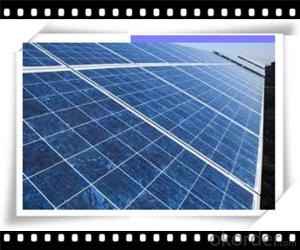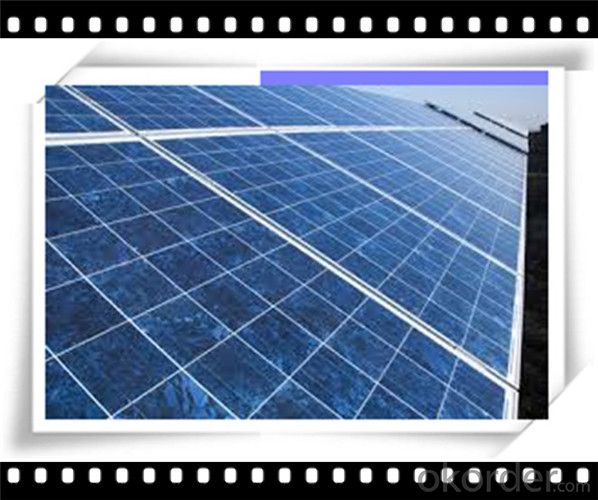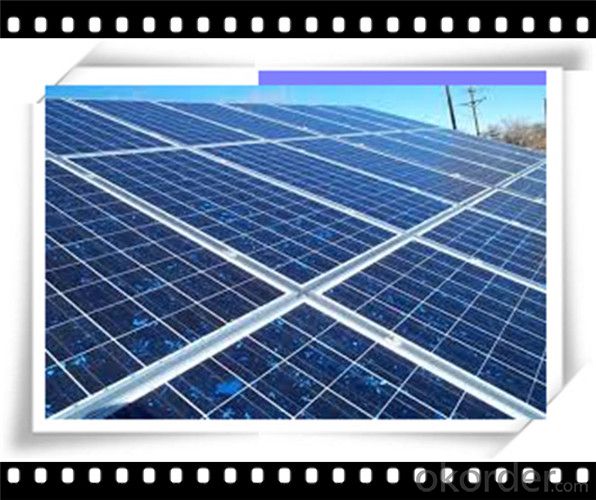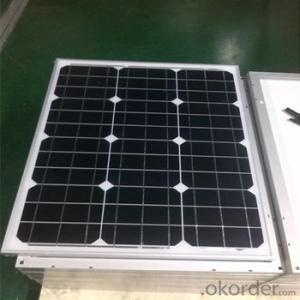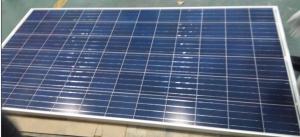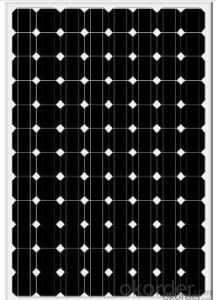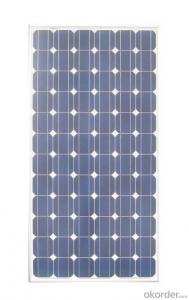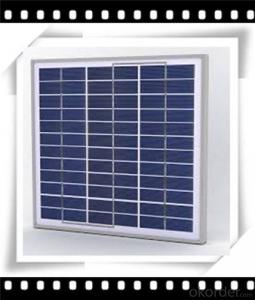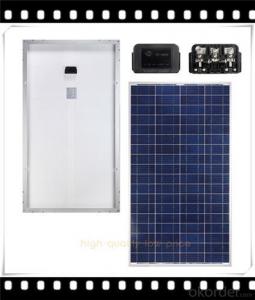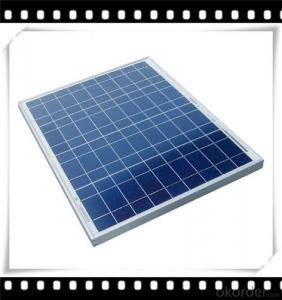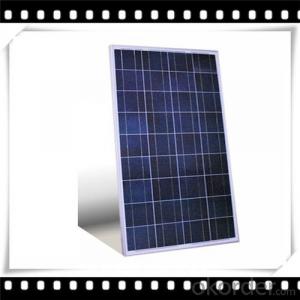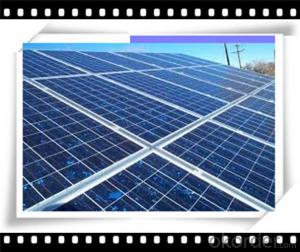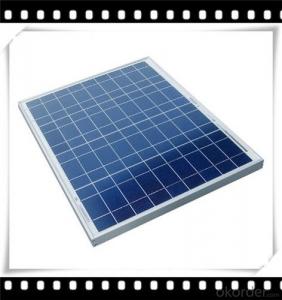QC Solar Panels 50W Poly Mini Newest CNBM Solar Panel
- Loading Port:
- Qingdao
- Payment Terms:
- TT OR LC
- Min Order Qty:
- 10 set
- Supply Capability:
- 300000 set/month
OKorder Service Pledge
OKorder Financial Service
You Might Also Like
Polycrystalline Solar Modules
CNBM offers a range of small, medium and large polycrystalline solar modules, designed for a range of requirements.
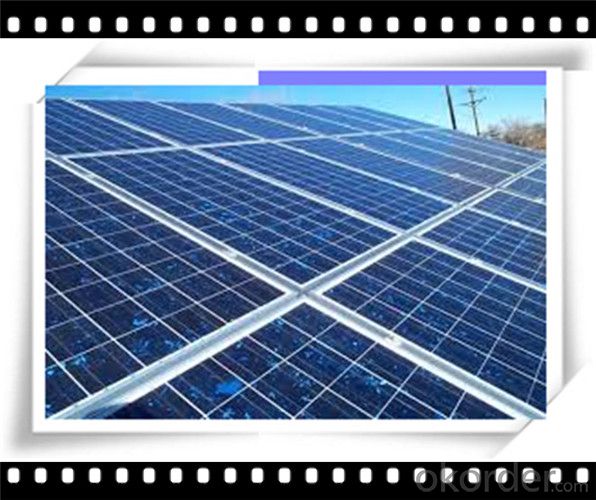
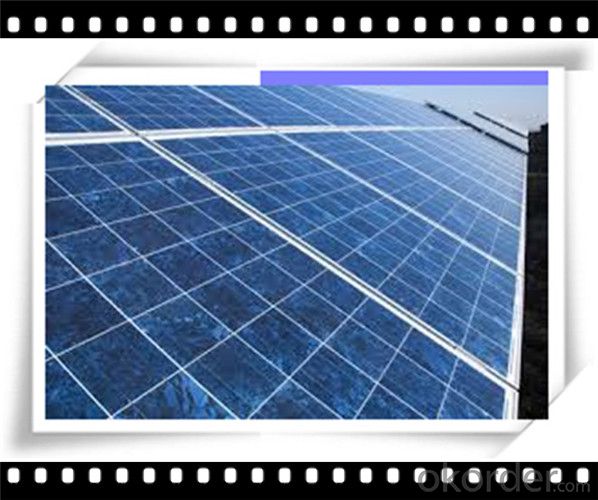
Specifications:
+/-3% |
Polycrystalline silicon solar cells (156 x 156mm) |
60 (10 x 6) |
1650 x 990 x 40 |
25.5 |
Limits:
Operating Temperature | -40~+85? |
Storage Temperature | -40~+85? |
Maximum System Voltage | 1000 VDC max. |
Hail Impact | Diameter of 28mm with impact speed |
Temperature and Coefficients:
NOCT | 48C+/-2? |
Voltage temperature coefficient (%/K) | -0.35 |
Current temperature coefficient (%/K) | 0.05 |
Power temperature coefficient (%/K) | -0.45 |
Characteristics:
Model: | SGM-200P | SGM-210P | SGM-220P |
Max-power voltage Vmp (V) | 29.2 | 29.4 | 29.41 |
Max-power current Imp (A) | 6.85 | 7.14 | 7.48 |
Open-circuit voltage Voc (V) | 36.5 | 36.69 | 36.9 |
Short-Circuit Current Isc (A) | 7.28 | 7.6 | 7.93 |
Max-power Pm(W) | 200 | 210 | 220 |
Model: | SGM-230P |
Max-power voltage Vmp (V) | 29.8 |
Max-power current Imp (A) | 7.72 |
Open-circuit voltage Voc (V) | 37.31 |
Short-Circuit Current Isc (A) | 8.19 |
Max-power Pm(W) | 230 |
STC: Irradiance 1000W/m2, module temperature 25?, AM-=1.5
Poly Crystalline Solar Panels Specifications Range
Maximum Power (Pm) | Dimension | Weight | Operating Voltage (Vmp) | Operating Current (Imp) | Open Circuit Voltage (Voc) | Short Circuit Current (Isc) |
0.45W | 140x80x10mm | 0.08kg | 3.3V | 150mA | 4.6V | 160mA |
1.0W | 162x140x10mm | 0.16kg | 7.5V | 150mA | 10.3V | 160mA |
4.5W | 269x251x23mm | 0.8kg | 16.5V | 0.27A | 20.5V | 0.3A |
10W | 420.1×268.9×22.6mm | 1.92kg | 17.5V | 0.58A | 20.5V | 0.6A |
20W | 425x502x50mm | 3.0kg | 16.8V | 1.19A | 21.0V | 1.29A |
30W | 593x502x22.6mm | 3.9kg | 16.8V | 1.78A | 21.0V | 1.94A |
40W | 655x537x50mm | 5.75kg | 17.3V | 2.31A | 22.1V | 2.54A |
50W | 839x537x50mm | 6.0kg | 17.5V | 2.9A | 21.8V | 3.17A |
65W | 1111x502x50mm | 7.2kg | 17.6V | 3.69A | 22.1V | 3.99A |
80W | 1204x537x50mm | 7.7kg | 17.6V | 4.55A | 22.1V | 4.8A |
- Q: Can solar panels be installed on a restaurant or food establishment?
- Yes, solar panels can definitely be installed on a restaurant or food establishment. In fact, many restaurants and food establishments are increasingly adopting solar energy as a sustainable and cost-effective solution to power their operations. By installing solar panels, these establishments can reduce their carbon footprint and save on energy costs in the long run.
- Q: hi,i have 4 solar panels. I can get 9V 400mA when i wired them parallel. The question is: how can i make a regulator circuit to store power into batteries.
- wire them in series parallel to get 8 volts at 200 mA, and that should charge a 2 volt battery. You may want to put in a series diode to prevent the battery from discharging into the panel when the sun is out. At 200 mA, depending on the battery size, you may not need much control, as that low a current will not overcharge a large battery, like a small auto battery. In fact it will take a very long time to charge it. edit: But do i need to add a regulator? If by that you mean a voltage regulator, no, as a solar panel has a high output resistance, and that will limit the current into the battery. If you mean a charge controller, if the battery is small, you may need a charge contoller to avoid overcharging the battery. But that is not a voltage regulator. .
- Q: I just moved into somewhere with solar panels but don't really understand them...all I know is that they heat the water.Do I still have to turn the hot water on with the solar panels or do they heat it automatically or do they store the energy until I turn on the hot water?!
- Custom solar-heating systems are unique. Does yours have a circulating pump? Does it have a storage tank? Is the fluid that goes to the panels separated from the household water and transfers heat through a heat-exchanger radiator, and the fluid has antifreeze in it? If it does, is the antifreeze of the variety that won't poison your family if there is a leak? Does your system have a thermostat-controlled pump that turns on when the water in the panels are hot? Does it have a limit-thermostat to turn off the pump when water in the storage tank is hot? There are many more variations to operation of solar-heating panels. Find out who designed it or who knows how to operate it and ask them.
- Q: Can solar panels be used to power a farm?
- Yes, solar panels can be used to power a farm. By harnessing the power of the sun, solar panels can generate electricity that can be used to run various farm operations such as irrigation systems, grain dryers, electric fencing, and even power agricultural machinery. This renewable energy source not only reduces reliance on fossil fuels but also helps farmers save on energy costs while promoting sustainability.
- Q: Can solar panels be installed on shopping malls or retail centers?
- Yes, solar panels can definitely be installed on shopping malls or retail centers. In fact, many shopping malls and retail centers across the world have already embraced solar energy as a sustainable solution for their energy needs. Installing solar panels on these commercial buildings not only helps reduce their carbon footprint but also provides long-term cost savings through reduced electricity bills. Additionally, solar panels on shopping malls can serve as a visible example of environmental responsibility, inspiring others to adopt renewable energy solutions.
- Q: What is the cost of installing solar panels?
- The cost of installing solar panels can vary depending on various factors such as the size of the installation, location, type of panels, and additional equipment needed. On average, a residential solar panel system can cost anywhere between $10,000 to $30,000 or more. However, it's important to note that there may be potential tax incentives, rebates, and financing options available, which can help offset the upfront costs and make solar panel installations more affordable.
- Q: Can solar panels be used to power a museum?
- Yes, solar panels can be used to power a museum. Solar panels convert sunlight into electricity, which can then be used to power various electrical systems and devices within the museum. The installation of solar panels on the museum's roof or surrounding areas can generate renewable energy, reducing the reliance on traditional energy sources and lowering carbon emissions. Additionally, solar power systems can provide a sustainable and cost-effective solution for powering a museum's lighting, climate control systems, and other electrical needs.
- Q: Can solar panels be installed on a tennis court or sports complex?
- Yes, solar panels can be installed on a tennis court or sports complex. The large open spaces and flat rooftops typically found in these areas make them suitable for solar panel installation. This can help generate clean and renewable energy while also reducing the electricity costs of the facility.
- Q: I got an 8v solar panel for a project today, the only problem is that it came without any wires attached to it. Now i don't know what type of wires i should use and if i should solder them on or if i should use epoxy instead. Can anybody help me out?
- You might want to be careful about soldering. Some panels can be easily damaged by excess heat. Check the manufactures website for recommended attachment methods. Solder tape or conductive epoxy might be better. If you do not have such things already, a good idea might be to take it into a TV repair shop or electronic hobbyist store. Some folks are kind enough to do it for you for free.
- Q: How do solar panels affect the roof's structural integrity?
- Solar panels do not significantly affect the roof's structural integrity when properly installed. The panels are mounted on a rack that evenly distributes the weight, and professional installers ensure that the roof can handle the additional load. In fact, solar panels can even provide some protection to the roof by shielding it from the elements.
Send your message to us
QC Solar Panels 50W Poly Mini Newest CNBM Solar Panel
- Loading Port:
- Qingdao
- Payment Terms:
- TT OR LC
- Min Order Qty:
- 10 set
- Supply Capability:
- 300000 set/month
OKorder Service Pledge
OKorder Financial Service
Similar products
Hot products
Hot Searches
Related keywords
